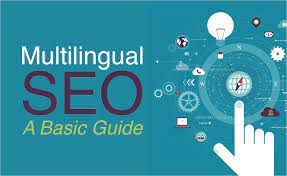In today’s globalized world, having a multilingual SEO strategy is crucial for businesses looking to expand their online presence and reach a wider audience. Multilingual SEO, also known as international SEO, involves optimizing your website and online content to rank well in different languages and regions.
One of the key benefits of multilingual SEO is the ability to connect with diverse audiences around the world. By creating content in multiple languages, you can attract more visitors to your website and improve user engagement. This can lead to increased traffic, higher conversion rates, and ultimately, more revenue for your business.
When implementing a multilingual SEO strategy, it’s important to consider several factors. First, you need to conduct thorough keyword research in each target language to understand how users are searching for information online. By using the right keywords in your content, meta tags, and URLs, you can improve your website’s visibility in search engine results pages (SERPs).
Furthermore, it’s essential to create high-quality, relevant content that resonates with your target audience in each language. This includes translating not just the text on your website but also images, videos, and other multimedia elements. Providing a seamless user experience across different languages will help build trust with your international visitors and encourage them to engage with your brand.
Another important aspect of multilingual SEO is optimizing your website’s structure for international audiences. This includes implementing hreflang tags to indicate the language and country targeting of each page on your site. Additionally, setting up geotargeting in Google Search Console can help search engines understand which countries you want to target with specific language versions of your site.
In conclusion, multilingual SEO is a powerful tool for businesses looking to expand their reach globally and connect with diverse audiences. By investing time and resources into optimizing your website for multiple languages, you can improve your search engine rankings, increase organic traffic, and drive business growth in new markets.
Top 8 FAQs About Multilingual SEO: Boost Your Global Reach
- Does language matter for SEO?
- What is multilingual SEO?
- How to correctly setup your SEO for different language and countries?
- What is multiregional SEO?
- Why multilingual SEO is important?
- What is multi language SEO?
- Does SEO work in other languages?
- Is multi language good for SEO?
Does language matter for SEO?
Language plays a crucial role in SEO as it directly impacts how users search for information online. Choosing the right language for your website content is essential for optimizing your site to rank well in search engine results. Search engines like Google use language as a key factor to determine the relevance of a webpage to a user’s query. By creating content in the language that your target audience uses to search, you increase the likelihood of your website appearing in relevant search results. Therefore, selecting the appropriate language for your SEO strategy is vital for attracting organic traffic and engaging with users effectively across different regions and languages.
What is multilingual SEO?
Multilingual SEO refers to the practice of optimizing a website and its content to rank well in search engine results pages across multiple languages and regions. It involves using targeted keywords, creating relevant content, and implementing technical strategies to attract and engage diverse audiences who speak different languages. By incorporating multilingual SEO techniques, businesses can enhance their online visibility, reach a broader global audience, and improve user experience for international visitors. This approach helps increase organic traffic, boost conversions, and ultimately drive business growth in various markets worldwide.
How to correctly setup your SEO for different language and countries?
Setting up your SEO for different languages and countries requires careful planning and execution to ensure optimal results. To correctly set up your multilingual SEO strategy, start by conducting thorough keyword research in each target language and region to understand how users search for information online. Implement hreflang tags to indicate language and country targeting on your website, helping search engines understand the relevance of each page to specific audiences. Create high-quality, localized content that resonates with users in different languages, including translations of text, images, and multimedia elements. Utilize geotargeting in tools like Google Search Console to specify which countries you want to target with specific language versions of your site. By following these steps and paying attention to detail, you can effectively optimize your SEO for different languages and countries, improving visibility and engagement across diverse audiences.
What is multiregional SEO?
Multiregional SEO refers to the practice of optimizing a website to target multiple geographic regions or countries. Unlike multilingual SEO, which focuses on language variations, multiregional SEO caters to different locations with distinct cultural nuances and search behaviors. This strategy involves implementing geotargeting techniques, such as using hreflang tags and setting up country-specific versions of a website, to ensure that content is relevant and visible to users in specific regions. By tailoring SEO efforts to target audiences in various locations, businesses can enhance their online visibility, attract local traffic, and improve their overall search engine rankings across different regions.
Why multilingual SEO is important?
Understanding why multilingual SEO is important is crucial for businesses aiming to reach a global audience effectively. By implementing a multilingual SEO strategy, businesses can enhance their online visibility, attract more international visitors, and ultimately drive business growth. Optimizing website content in multiple languages helps improve search engine rankings in different regions, increasing the chances of reaching target audiences in diverse markets. Additionally, multilingual SEO demonstrates a commitment to providing a seamless user experience for non-native speakers, building trust and credibility with international customers. Overall, investing in multilingual SEO is essential for expanding brand reach, increasing website traffic, and staying competitive in today’s global marketplace.
What is multi language SEO?
Multi-language SEO, also known as multilingual SEO, is a strategic approach to optimizing websites and online content for multiple languages and regions. It involves implementing techniques to ensure that a website ranks well in search engine results across different languages, allowing businesses to reach and engage with diverse audiences globally. By tailoring keyword research, content creation, and website structure to various languages, multi-language SEO aims to enhance visibility, attract international visitors, and ultimately drive organic traffic and conversions in multiple linguistic markets. This comprehensive strategy enables businesses to expand their online presence effectively and connect with users worldwide in their preferred languages.
Does SEO work in other languages?
Yes, SEO can be highly effective in other languages through a practice known as multilingual SEO. Optimizing your website and online content for different languages allows you to reach a broader audience and improve your visibility in international search engine results. By conducting keyword research, creating relevant content, and implementing proper technical optimizations for each target language, you can enhance your website’s performance in foreign markets. Multilingual SEO is essential for businesses looking to expand their online presence globally and connect with diverse audiences across language barriers.
Is multi language good for SEO?
Implementing a multilingual SEO strategy can be highly beneficial for improving your website’s search engine optimization (SEO) efforts. By offering content in multiple languages, you can attract a broader audience and increase your website’s visibility in different regions. Search engines like Google value user experience, and providing content in the language that your target audience speaks can enhance user engagement and ultimately lead to higher rankings in search results. Additionally, multilingual SEO allows you to target specific keywords in different languages, expanding your reach and driving more organic traffic to your site. Overall, incorporating multiple languages into your SEO strategy can help strengthen your online presence and boost your website’s performance across global markets.




